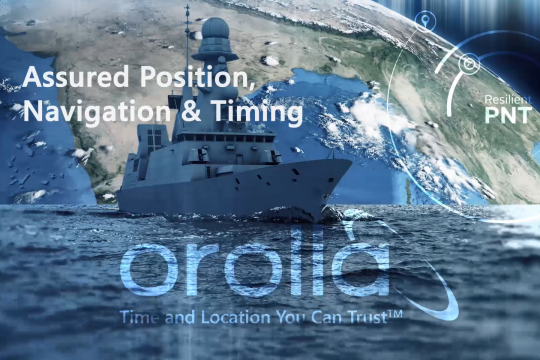News
Navwar Threats - How to Protect Naval Operations
(By Stéphane Chèze, Business Development Director, Government Systems) Navigation warfare (Navwar) is an ever-increasing threat to naval missions, some of the most complex, covert and remotely operated military missions in the world.

The naval theater of operations today relies on access to secure, continuous and reliable Positioning, Navigation and Timing (PNT) data for critical situational awareness and C5ISR systems.
PNT signals are ubiquitous in the navy, from base and shipyard infrastructure to onboard systems in ships, aircraft and vehicles to protecting individual sailors. Assured PNT signals are essential, even in GPS denied environments, to enable sensitive embedded navigation, communication and identification systems.
As military forces know all too well, the primary source of PNT information is GNSS (Global Navigation Satellite System) sources such as GPS or Galileo. These satellite signals are vulnerable to interference - either from natural causes or intentional jamming, and even signal manipulation to provide systems with false data, known as spoofing.
In addition to protecting shipboard operations, Assured PNT impacts critical infrastructure for naval bases, command and control centers, unmanned underwater, surface or air missions, as well as the protection of assets and personnel in distress. Watch our new video to explore the spectrum of naval operations that rely on Assured PNT.
A Growing Threat
Military forces around the world are seeing an increase in adversarial GPS jamming and spoofing attacks that threaten naval operations. In a recent article in Voice of America, Adm. John Richardson, chief of US naval operations, confirmed that sailors on the high seas are having to defend themselves from Russian electronic jamming devices like those used against U.S. ground troops in Syria, confirming that such jamming has "absolutely" been experienced in international waters.
Even in shallow water, naval or Coast Guard operations such as fishery control operations, counter narcotics operations, and traffic surveillance missions are threatened by low-cost jamming and spoofing devices that mariners can use to defeat their own tracking systems like Automated Information Systems (AIS) or Vessel Monitoring Systems (VMS) to conduct illegal activities. Navies and Maritime Law Enforcement Agencies must be able to detect, localize and intercept these offshore criminal activities.
How can the world’s naval forces defend themselves against Navwar attacks to maintain and improve military superiority and ensure the safety of personnel and equipment?
Shipboard PNT Signals
There are many critical naval applications that rely on Assured PNT data, including:
- Navigation systems
- Automated information systems
- Vessel monitoring systems
- SATCOM antenna orientation
- Cryptology
- Datalinks: Link 16, Link 22 (used for targeting)
- Combat and ship network system synchronization
- Surveillance systems (Sonar, Radar, etc.)
- Weapon systems
- Embarked aircraft operations
As you consider each PNT application, consider these factors regarding mission vulnerability if GPS is denied:
- Are these systems centralized or stand alone ?
- Are they backed-up locally ?
- Do you know precisely where all PNT data sources are installed ?
Ships have long lifetimes and require several upgrades and adaptations over time. For example, do you know how many GPS/GNSS antennas you have on your ship? Each of these areas is a source of potential PNT weakness.
Naval Assured PNT Solutions
Naval Assured PNT solutions should be flexible and scalable to offer the appropriate level of protection for each requirement, whether for critical infrastructure, mobile mission systems or vulnerability testing and mitigation. With layered PNT technologies, naval forces can take a practical approach that includes:

Below is an example of how Orolia delivers Assured PNT solutions to ensure critical naval operations, even in GPS denied environments.

As enemies grow more sophisticated in their ability to wage electronic warfare in the naval domain, the world’s navies must increase their awareness of PNT vulnerabilities and the solutions available today to increase resiliency. Accurate and reliable PNT data is at the core of situational awareness, military operations and C5ISR systems to help ensure mission success both onshore and at sea.
Source: TMC
Others
- TECOTEC GROUP ATTENDED SHIMADZU’S SERVICE MANAGER MEETING IN 2022
- TECOTEC HANDED OVER EDX-7000 X-RAY FLOURESCENCE SPECTROMETER AT NIDEC CHAUN CHOUNG VIETNAM
- INSTALLATION OF CHIP PROCESSING SYSTEM – LANNER/ GERMANY
- TECOTEC completed installation of EDX-LE Energy dispersive X-ray Fluorescence spectrometer at DYT Vina
- TECOTEC DELIVERED AND INSTALLED THE 2ND X-RAY FLUORESCENCE SPECTROMETER - EDX-LE PLUS AT TABUCHI
- TECOTEC Group has handed over PDA-7000 Optical Emissions Spectrometers for Nihon Plast Vietnam
- Bowman XRF Coating Measurement System For Electroless Nickel Plating
- TECOTEC DELIVERED AND INSTALLED SMX-2000 SYSTEM TO NIDEC TECHNO MOTOR VIETNAM



